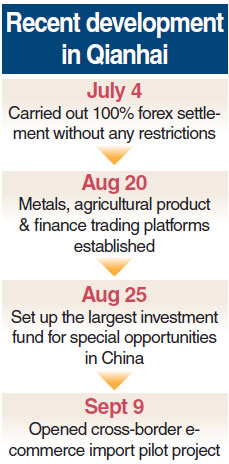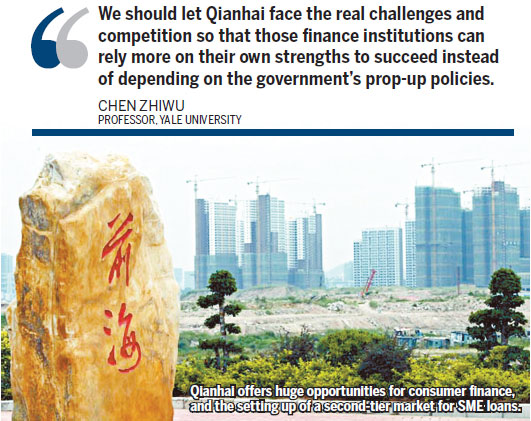Major forex settlement lift for Qianhai
Updated: 2014-09-17 06:19
By Chai Hua(HK Edition)
|
|||||||||

Qianhai is at the center of the mainland's strategy to transform a 15-sq-km area in Shenzhen into a modern services hub by 2020. To achieve the goal, Qianhai has applied for many government-guided finance policies. But, experts say the zone should face global competition independently. Chai Hua reports
It's easy for experts to comment on Qianhai's progress from their cosy air-conditioned offices in Hong Kong. But it must be pointed out that since the Qianhai Economic Zone project was approved by the State Council in 2010, progress there has come about slowly.
Little had been accomplished almost four years after the development plan was unveiled, owing to unforeseen setbacks. Things didn't really start moving forward until last year.
Officials acknowledged there have been problems with transportation, land reform and cross-border management, and those don't exhaust the list by any means. The new plan that came out on February 27 addressed five key areas of free trade development in the Qianhai and Guangdong-Hong Kong-Macao region.
The central bank, the China Insurance Regulatory Commission (CIRC), the China Banking Regulatory Commission (CBRC) and the China Securities Regulatory Commission (CSRC) have approved about 28 new financial innovative policies for Qianhai, Shenzhen Mayor Xu Qin said on August 20.
A Qianhai authority spokesman said earlier this month that foreign companies with investments in the economic zone are allowed to convert any amount of foreign exchange at any time they want since August 4.
Zhang Jianjun, president of the central bank's sub-central branch in Shenzhen, recently confirmed the policy, saying foreign companies registered in Qianhai are free to choose the time and ratio of foreign exchange capital settlement.
"It means a 100-percent realization of foreign exchange settlement without any restrictions whatsoever. In addition, companies are allowed to use the renminbi after the foreign exchange settlement. As such, the policy gives the right to manage foreign exchange settlement back to companies, helping them to avoid losses caused in exchange rate fluctuations.
"It also allows foreign investment enterprises to use the exchanged renminbi in equity investments with a pledge that their investment project will be legitimate in the territory. That's a major breakthrough," Zhang said.
'Super good news'
He Longde, director of the finance division at the Qianhai Authority, said: "It's super good news for foreign private equity companies."
The Qualified Domestic Limited Partner (QDLP) program has been in effect in Qianhai since early August. It allows qualified domestic investors to raise capital with a $1 billion limit which they can use in overseas innovative investment, including equity and industrial investment.

In February, Qianhai began implementing the Qualified Foreign Limited Partner (QFLP) program. So far, 39 foreign equity investment and management companies have registered in the cooperation zone.
"Both the QFLP and QDLP provide a much more convenient investment channel and wider investment scopes for equity investment companies in cross-border two-way investment," Zhang explained.
Besides Qianhai's exploration of the nation's innovative financial reform policies, the experimental and exemplary zone has also seen major breakthroughs in the policies shared by other economic zones.
Explaining Qianhai's advantages in conducting cross-border RMB loans, He Longde said: "We've no limitation on the loan amount and duration, while in some economic zones, companies can only borrow once based on its registered capital and the duration must exceed one year."
By July 31, on-record, cross-border loans in Qianhai had totaled 44 billion yuan, of which about 70 percent are this year's new loans.
Qianhai's financial innovation depends greatly on the nation's development background, especially economic restructuring and opening of capital account.
Chen Zhiwu, professor in school of management at Yale University and an expert on China's economy and capital markets, told a forum organized by Nanfang Daily on August 26: "Qianhai's breakthrough in financial innovation meets the needs of development of the age. The economic restructure has also provided many financial innovation opportunities, where Qianhai can accomplish a great deal.
"Whether Qianhai can accomplish more financial innovation also depends on the opening scale of China's capital account, but to my understanding, there is a large dispute between the authorities and the market on this issue."
Still, he believes Qianhai has huge space for development in consumer finance, family finance, and the establishment of a second-tier market for small and medium-sized enterprise (SME) loans, especially in finance and fund management.
Negative influence
Chen said he was also worried that too many preferential policies may have negative influence on Qianhai's future.
"In the initial stage of Qianhai's development, it could depend on the central government's preferential policies to attract many companies. Soon, however, these policies will conversely hurt the cooperation zone's development," he said.
"We should let Qianhai face the real challenges and competition so that those financial institutions can rely more on their own strengths to succeed instead of depending on the government's prop up policies," he suggested.
Besides the policies, Qianhai's financial innovation also reflects on the diversity of its financial organizations and enterprises.
Approved by the CBRC on July 25, the private bank in the Qianhai economic zone, named Webank, is expected to open for business at the end of this year. Gu Min, former executive director at Ping An Bank, was appointed chairman of Webank. The 39-year-old Gu had worked in Ping An Bank for 14 years and had accumulated rich experience in innovative finance and business.
"Qianhai Webank will become China's first Internet bank and it's very different from other banks in China. Relying on its parent company Tencent's huge customer resources, it will become the bank with the largest number of customers in China," Gu said.
The bank has three billion yuan ($485 million) in registered capital, with Tencent holding a 30-percent stake, and Shenzhen Baiyeyuan Investment Co and Shenzhen Liye Group each holding a 20-percent stake.
"It will become a pure Internet bank, meaning it will hire less employees and has no plan to set up branches. Its main business will be operated through the Internet," Gu said.
The bank plans to hire about 500 people and 70 employees have been recruited so far.
Tencent aims to provide innovative and tailor-made services to retail customers and small firms by putting all the resources on the Internet.
In addition, the bank will take advantage of Tencent's Internet techniques and use big data to control bank risks, on the base of a national level risk control system.
Contact the writer at grace@chinadailyhk.com

(HK Edition 09/17/2014 page9)